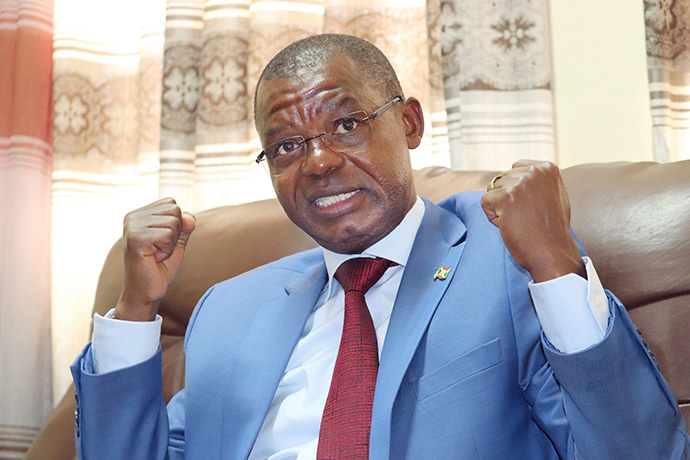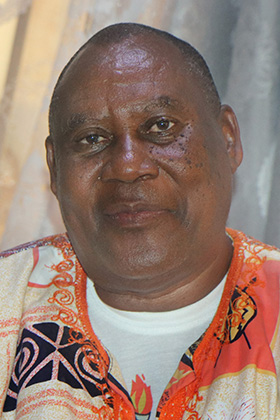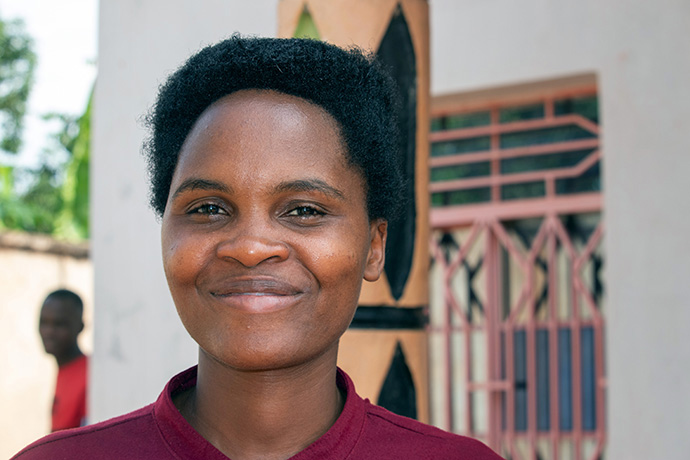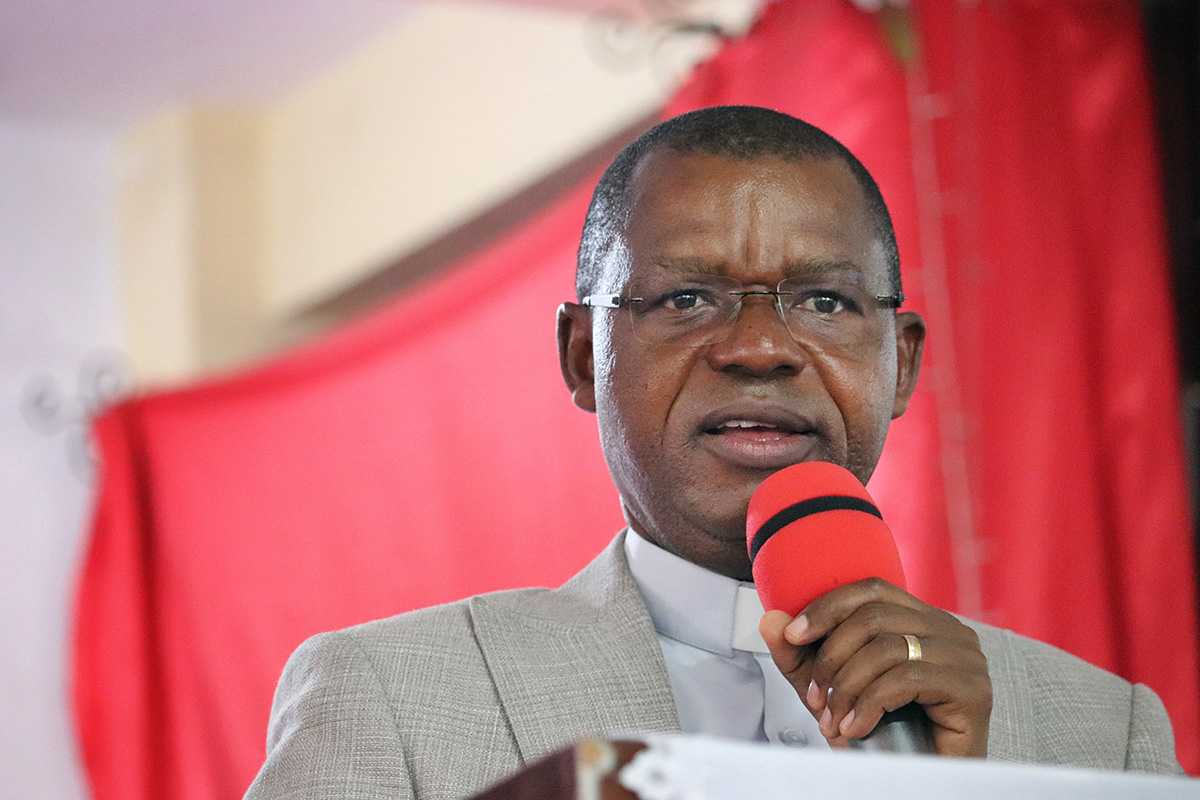Key points:
- Three prominent United Methodists in Burundi credit their accomplishments to the profound teachings of the church and their faith in God.
- The Rev. Emmanuel Sinzohagera serves as a legal representative and dean of superintendents for the church and as speaker of the Senate in Burundi. He is the third highest-ranking person in the country.
- Georges Nshimirimana is lay leader at Saint-Pierre Parish in Gitega. He also heads the National Council for the Defense of Democracy.
- Lydie Nihimbazwe is the youngest municipal administrator in the country. Her experience in The United Methodist Church prepared her well for her life in politics, she said.
In Burundi, three United Methodists have successfully navigated both the church and politics. Extending beyond personal conviction, their faith is linked with their approach to governance and leadership in politics, and shaped by their experiences in The United Methodist Church.
“As a lifelong member of The United Methodist Church,” said the Rev. Claude Ntakarutimana, “I’ve always felt our leaders genuinely care about both our spiritual growth and our nation’s progress.” He chairs the Burundi Conference Board of Ordained Ministries.
“The President of the Republic’s consistent presence at our events, be it the inauguration of our institutions or the culmination of an evangelization crusade, even in the most secluded areas, speaks volumes about the profound reverence he has for our church and its mission,” Ntakarutimana said, speaking of President Évariste Ndayishimiye.
Here are vignettes about three influential United Methodist leaders.
The Rev. Emmanuel Sinzohagera
“Whether I stand behind the pulpit or in the parliament,” said the Rev. Emmanuel Sinzohagera, “my mission remains unaltered: to serve God and uplift our community.”
A key figure in Burundi’s spiritual and political realms, Sinzohagera exemplifies the close ties between The United Methodist Church and the nation’s governance. In the church, he serves as a legal representative and dean of superintendents. As speaker of the Senate in Burundi, he is the third highest-ranking person in the country.

Last autumn at Rohero United Methodist Church, which also doubles as conference headquarters, 14 United Methodist communicators completed a week of training led by United Methodist Communications. Anticipation filled the room as the communicators prepared to celebrate their accomplishment. The atmosphere suddenly shifted when Sinzohagera invited the facilitators for a luncheon at his residence atop Colline Nyambuye. A convoy of powerful vehicles with heavily armed guards geared up. They sped off in the two-lane streets of Bujumbura, the economic capital of Burundi, ignoring traffic lights, only slowing for tight turns or in densely populated areas.
The next day, the setting remained the Rohero compound, but the mood was transformed. The church was packed as 500 worshippers gathered for the service. In the crowd, Sinzohagera blended in seamlessly. He was one of them. Seated among other pastors, he joyfully participated, even breaking into dance during the hymns.
Without fanfare, he stepped up to the pulpit to preach. Drawing from Nehemiah 2:18, he spoke passionately about the significance of building the church, the 2023 annual conference theme. While he referenced the past, his message was forward-looking, inviting the United Methodist community around a shared vision for the future.
This juxtaposition illustrates the melding of faith and politics in Burundi, where United Methodist leaders navigate both spiritual and political waters.
“Church and politics often intersect,” Sinzohagera said. “In many ways, everything has a political dimension, even within the church.”
The modern history of Burundi, first colonized by Germany and later by Belgium, has been marked by ethnic tensions and civil strife, predominantly between the Hutu and Tutsi ethnic groups. During the 1990s, the church played a pivotal role, bridging divides and facilitating dialogue, making it an influential entity in Burundi’s sociopolitical landscape.
“The United Methodist Church in particular spearheaded numerous peace and reconciliation initiatives, working tirelessly to mend the fractures of a divided nation,” Sinzohagera said. “The church’s emphasis on unity, forgiveness and community restoration made it an integral pillar in Burundi’s journey toward lasting peace and stability.
“We find ourselves in today’s challenges because the church has retreated, leaving the stage to those without our guiding faith,” he continued. “Merely fasting and praying will not change our circumstances. We must actively engage and represent the true interests of the people. It is not only acceptable but (also) essential for clergy to partake in politics, ensuring we are genuine ambassadors of Christ’s teachings.”
Sinzohagera reflected on his faith journey. Faced with the dire circumstances of war in the Democratic Republic of Congo, Sinzohagera made a heartfelt plea: “God, if you hear me, get me out of this land. I will serve you.” He never forgot this promise made amid despair.
Returning home, he said, “I started participating in church services. Finally, I remembered the promise I made to God during the Congo crisis: I will serve the Lord.”
Over 15 years, Sinzohagera served as pastor of three churches: Kabezi, Gatumba and Rohero.
“In each,” he said, “I realized my key contribution was building the church, literally. Later, I served as district superintendent for Bujumbura for five years. In 2021, I was elected as the legal representative, and the same year, I was appointed as the dean of superintendents.
“By God’s grace and wisdom, I navigate the distinct paths of church and parliament. Each role demands its own integrity, and in both, I strive to serve with understanding and respect for the diverse beliefs of my congregation.”
Georges Nshimirimana

Georges Nshimirimana is another prominent United Methodist who bridges faith and politics. As lay leader at Saint-Pierre Parish in Gitega, he serves as the national president of the United Methodist Men’s organization.
For 15 years, Nshimirimana served as a member of the Burundian parliament. Today, he heads the National Council for the Defense of Democracy — Forces for the Defense of Democracy, the ruling party for Gitega Province, the political capital. Nshimirimana believes that faith and politics are inherently linked, especially within his party.
“For the ruling party,” he said, “the primary commitment is to serve God. God holds the first place in all activities. Our faith gives us clarity. When you deviate, it’s evident that you’re not aligned with the party’s guiding principles.”
He is a member of the conference boards of Nomination and Ordained Ministries. Beyond these responsibilities, Nshimirimana continues his passion for music and worship as the choir coordinator for the Gitega parish.
His journey to becoming a United Methodist was rooted in his passion for music. Originally a Catholic, Nshimirimana became involved with his adopted denomination when the late Bishop Alfred Ndoricimpa asked him to oversee the church choir. Although he initially took on the role while still a Catholic, his consistent involvement with the Methodist Church choir led him to spend more Sundays at the United Methodist parish.
“Over time, I felt the need to belong to just one congregation,” he said, “I chose The United Methodist Church because of my genuine connection to the community.”
Nshimirimana maintains a strong relationship with the Catholic community, emphasizing unity and friendship across denominations. He appreciates the teachings of Methodism founder John Wesley, particularly the idea of having a “holy spirit in a holy body.” He is also somewhat familiar with Charles Wesley, John’s musician brother.
“The Bible is my primary tool,” Nshimirimana said. “It is my friend, and I consult it often.”
Lydie Nihimbazwe
Elected in July 2020 to a five-year term as the mayor of Giharo at age 29, Lydie Nihimbazwe is the youngest municipal administrator in the country. Giharo is in the southern part of Burundi’s Rutana province.

A member of the National Council for the Defense of Democracy — Forces for the Defense of Democracy, Nihimbazwe sees her rise in politics as a testament to God’s grace.
“It’s by the grace of God that I’m in this position,” she said.
She is grateful for her appointment despite the presence of older, more experienced candidates. Her election came as a surprise to many, including herself.
“When it was announced that I was elected,” Nihimbazwe remembers, “the shock was so great that I burst into tears of joy. The ruling party put me forward, and the population elected me.”
This mother of a 2-year-old daughter comes from a mixed religious background with a Catholic father and a Methodist mother.
Her experience in The United Methodist Church, from children’s Sunday school to choir member to vice president of the local church youth organization, prepared her well. “I deeply appreciate the way The United Methodist Church offers young people the opportunity to become fully involved in Christianity,” Nihimbazwe said.
For her, the church’s teachings are not just spiritual guidelines but also principles that inform her political decisions. “Thanks to the education I received at church,” she said, “I avoid sins like misappropriating communal funds.”
Nihimbazwe starts her day with meditation and prayer. When she doesn’t have scheduled meetings, she maintains a steady routine. After her devotional activities, she makes her way to the office to interact directly with the public, addressing their concerns. She also plans field visits, where she mediates to resolve community disputes or differences.
Subscribe to our
e-newsletter
“As administrator,” she said, “I face a variety of challenges in my community, from infidelity due to the region’s widespread polygamy, to land issues and theft, to providing a solution to everybody’s needs.”
She appreciates that “numerous opportunities like agriculture can serve as a springboard for the growth and development of the youth.”
Before her mayoral election, Nihimbazwe managed a health center. That job was easier, she admits. “Managing finances is one thing, but managing people is an entirely different arena,” she said. “Human relations are complex. Without God’s intervention, it is impossible to succeed.”
She believes that women and youth have a crucial role in leadership. Nihimbazwe stresses the need for women to support each other and credits the church for placing all people on equal footing.
“There’s been a lack of solidarity among women and a lack of trust in the youth,” she said. “But now, women are regarded equally with men in all sectors, both in the church and the country. The youth are being given responsibilities. The United Methodist Church is not just a place of worship, but a platform where young people and women can actively engage and find their place.”
Drawing from her own experience, she works to inspire the youth, particularly girls, since many parents don’t encourage their daughters to continue their education. Nihimbazwe uses her own achievements to motivate others toward a more promising future.
She leads a team of 45 staff members, ensuring the welfare of more than 200,000 residents spread across an area of over 225 square miles, “the largest commune of the country” she said.
“As my mandate draws to a close in two years,” Nihimbazwe said, “I firmly believe that God will guide me to serve in other capacities.”
Broune directs French news for UM News and is based in Abidjan, Côte d'Ivoire.
Contact: Julie Dwyer, Editor, newsdesk@umcom.org or 615-742-5469. To read more news from The United Methodist Church, subscribe to our free daily or weekly newsletters



